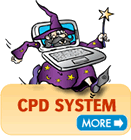News incl maintaining CPD and furnished holiday let alternative
|
Posted Dec 08, 2016
This update covers: 1. Maintaining your Personal Taxation knowledge through CPD However, due to some changes in taxation and other laws, there are certain changes which create new impacts on a number of areas important to the provision of advice. The main changes to the sections for the R03 Personal Taxation online course are listed below and are included in our accredited CPD system. All changes have also been reflected in the chapter assessments and the gap analysis assessments. Although throughout the online courses there are many other minor amendments, as a part of your ongoing CPD it is recommended that you fully familiarise yourself with these major changes to ensure that your knowledge and understanding is fully up-to-date. By using the Wizard Learning accredited CPD system you will have access not only to all these updated courses but also all the learning materials for all of these diploma courses. These can be used at any time to refresh your knowledge of specific areas, and by carrying out gap analysis assessments over the year from each of the subjects as a part of your overall CPD plan, you can use the assessment results to identify areas of weakness against the learning outcomes and plan future CPD activities. R03 Personal taxation: Online Multimedia Course
The top 5 areas covered by the major changes to consider first are:
Free trial - Try the CPD system before you purchase 2. Learning to Learn Introduction to Learning to Learn Learning is something that we have been doing since birth and without it we would have had great difficulty in maturing into effective adult members of society. Every task we undertook and every day would have been a struggle for survival, with little time in our lives for relaxation or enjoyment. Although we could easily identify the knowledge and skills we have learnt from our formal education, jobs, hobbies and social activities, many people are unaware of how that learning has actually taken place. From our years at school we learn a vast amount, but not how to actually learn and the skills involved in learning are very much left for each individual to figure out on their own. This may explain why some people seem to be more successful at learning than others. Due to each individual’s unique characteristics, some people will have certain innate abilities that help them to learn, but the actual skills of learning can be acquired by anyone. Lifestyle changes However, without an awareness of the skills involved in learning or where to acquire them, the process can often be very difficult and stressful, but it doesn’t have to be. The Learning to Learn series of online courses can help you to; improve your reading skills, increase your memory and mental agility, develop effective study skills, manage time effectively and face any exams within the process in a calm and confident way. These online courses will be of benefit to anyone involved in learning, whether this is to; obtain qualifications at school, university or in a work-related context, assist with professional development or for personal pleasure. Despite their overall focus leaning towards the more academic style of learning, the attitudes and skills they will help to develop and the principles and practices they explain are equally relevant to those planning to learn more practical skills. Reading online course Memory and mental agility online course Study Skills online course Time Management online course Exam Skills online course Course summary Provided FREE when you purchase any of our training modules. 3. Furnished holiday let alternative? With a BTL there is no capital gains tax (CGT) relief and next year will see the start of the restricted income tax relief on interest payments, and although some of the advantages for FHLs have been reduced over the years, they are still treated as a trading venture and so enjoy certain advantages not available to the BTL investor. The first point to make is that profits from a FHL can be used to make pension contributions, which has always been seen as a significant advantage. Secondly, capital allowances can be claimed on plant and machinery bought to furnish the property/ies (equipment such as white goods, furniture and other movable items). If a loss is made from a FHL these can only be offset against profits from the letting business (prior to 2011 it was possible to offset losses against other income). This still means that if a loss is made on one property this can be offset against the profit on a different one. This is because all FHLs owned by the same person are treated as one letting business. FHLs also qualify for certain CGT reliefs; if a property that has always been used as a FHL is sold, any capital gain arising on its disposal can benefit from roll over relief. This applies where the proceeds are reinvested into another let property or any other asset used for a trading purpose. The gain is treated as being zero and the acquisition cost of the bought asset is reduced by the amount of the gain. In this way, the gain is just being deferred until the replacement asset is sold. Hold over relief can also apply if the property is given away as it is classed as a business asset and this also effectively defers a CGT liability. Finally, entrepreneurs’ relief can also apply to the disposal of a FHL business which reduces the rate to 10%. To qualify as a FHL and enjoy these tax advantages, the property must be in the UK or in the EEA which includes Iceland Liechtenstein and Norway and - no surprises here - it has to be furnished. The property must be commercially let (i.e. let for profit) and the total of FHLs in the UK are taxed as a single UK business (all FHLs in other EEA states are taxed as a single EEA business - separate records will therefore need to be kept for both). There are also occupancy conditions; the minimum period the property must be actually let in a year is 105 days and it must be available for letting for 210 days. For most businesses this second rule should not cause a problem; most holiday lets will be available for letting on a commercial basis. The 105 day test means the property must be actually let for 15 weeks a year; any days which have been let to friends or family at reduced or zero rates cannot be counted as these are not ‘commercial’ so properties will have to be actively marketed and advertised to ensure the 15 week rule is met. Having said that, if a property isn’t let for 105 days there are two elections that can be made. The averaging election can be used if there is more than one property. This is an election to use the average rate of occupancy for all the properties. There is also a ‘period of grace’ election; where a property does not meet the actual occupancy test then, provided that it qualified as a FHL in one year it may be deemed to qualify for up to two following years. However the owner must be able to demonstrate that it was marketed and available for letting. All of these advantages could provide the disgruntled BTL investor with an alternative. And even though when we think of a furnished holiday let we probably think of sandy beaches, crab sandwiches and seagulls, in reality the property could be located absolutely anywhere not just a typical holiday destination. Wizard Learning Ltd Provider of accredited online training and CPD system for financial advisers and financial services professionals. We are committed to helping you gain higher level qualifications and maintain this knowledge through effective continuous professional development. |



